Champions of Change Blog
Nominate a White House Champion of Change: Veterans on the Front Lines of Advancing Clean Energy and Climate Security
Posted by on August 16, 2013 at 8:52 AM ESTIn answering our nation’s call to service, America’s veterans understand the challenges of energy availability and the threats of a changing climate on the safety and effectiveness of our troops and our national security. From the dangers and logistical challenges of transporting vital energy supplies, to concerns of natural resource scarcity, these heroes have been on the front lines dealing with the security implications of a changing climate.
Upon returning home from service, many veterans of Iraq and Afghanistan have continued to serve, using their specialized skills and experiences to advance energy efficiency and renewable energy, make communities more resilient to the effects of climate change, and improve our nation’s energy security. In his Climate Action Plan, the President emphasized that failing to address climate change will threaten millions of people around the world and increase security risks. Improving preparedness and promoting energy independence helps strengthen national security and makes our troops and communities safer.
In early October, which the President designated “Energy Action Month”, the White House will recognize “Champions of Change” – Iraq and Afghanistan veterans who are leading communities to prepare for the impacts of climate change and transition to a clean energy economy. We need your help to identify these veterans and recognize their extraordinary efforts. Champions may be veterans who are:
- Entrepreneurs working to implement technologies or techniques for clean energy, energy efficiency, or other new approaches to combat climate change
- Professionals working to make military bases, cities, or other communities resilient to extreme weather or sea level rise
- Businesspeople finding solutions that make communities energy independent and create jobs in clean energy
Help us recognize veterans who are leading and educating their communities on solutions to combat climate change. Click here to nominate a Champion of Change today! After following the link, select "Veterans in Clean Energy and Climate Security" as your nomination category. Please submit nominations by 5:00 PM on Wednesday, September 4th. We look forward to hearing from you!
Rohan Patel is the Associate Director for Public Engagement at the Council on Environmental Quality
Learn more about Energy and Environment, VeteransIncreasing Peer Support and Youth Involvement Statewide and Spreading Hope Along the Way
Posted by on August 15, 2013 at 2:09 PM EST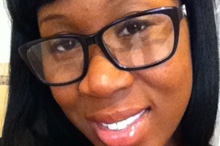
Desiree Moore is being honored as a Champion of Change for embodying the next generation of leadership within the disability community and her commitment to the promise of the Americans with Disabilities Act.
I’m honored to be a White House Champion of Change.
My name is Desiree Moore, and I grew up in Long Island, New York. My motivation to get involved in my community stemmed from a need to find something positive in the challenges of life.
I entered the foster care system in 2007, and I was facing so many changes at that time. I really felt myself wanting to give up. Being introduced to advocacy and learning to advocate for myself, gave me hope and inspired me to help others. Oftentimes when we go through different challenges we lose hope. Through sharing my story and overcoming personal adversity, my goal is to spread hope and help others to do the same.
The year 2010 was a great year for me.I was awarded Outstanding Youth Advocate of the year, and several months after I was offered the Long Island Regional Partner position with YOUTH POWER!YOUTH POWER! is a New York statewide network for young people who have disabilities and cross systems experience.
Through my role as a Regional Youth Partner, I have partnered with a Children’s Psychiatric Hospital to create a youth advisory council where the young people are afforded an opportunity to express areas of appreciation and areas that needed improvements. When youth have input in all services they receive it ensures that their needs are being met and that administration knows how their programs are being delivered. I also had an opportunity to work with a residential treatment facility for adolescent girls with mental health challenges to create a place for them to receive support just from their peers. I have also worked with this group to help them sustain their peer support group. YOUTH POWER! participates in New York State’s deinstitutionalization efforts but we feel it’s important for youth to have a voice and hope wherever they are.
In addition, my team and I created a presentation called “Spreading Hope Through Sharing Our Stories” to empower young people and let them know there is hope.We focus on raising disability awareness, breaking down stigma and speaking the truth about what it is like to be in the system.This presentation has inspired many young people to not give up and showed them they are not alone.
When I’m not working directly with other young people I serve on government and community committees to bring youth voice to the table. I’m currently in college majoring in event management. I aspire to become an event planner, and plan to donate a percentage of my profits to develop a program to acknowledge and celebrate birthdays for children in foster care. There have been many young people whose birthdays have been forgotten in foster care. I want to change that.
Thank you for recognizing my work, and for giving me an opportunity to share my heart with you. To me, being a Champion Change means that despite life’s challenges, aim high, be the best you can possibly be, and help others along the way.
Desiree is a leader working at YOUTH POWER!.
Learn more about Civil Rights, DisabilitiesIt’s Time to Come Out of the Closet
Posted by on August 15, 2013 at 2:04 PM EST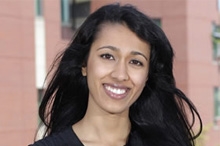
Anupa Iyer is being honored as a Champion of Change for embodying the next generation of leadership within the disability community and her commitment to the promise of the Americans with Disabilities Act.
Anorexic/Bulimic…Suicidal…Bi-polar…Institutionalized. These words don’t typically describe a Champion of Change, but they describe me. And these words describe countless others in our society who have a psychiatric disability but are too afraid to come out of the shadows and be themselves.
Because of social stigma, too many people who suffer from mental illness feel alone, powerless, and hopeless.
As I got better, I found reintegrating into society by working and living independently was not easy. I was unable to honestly explain the gaps on my resume to potential employers because I was afraid I wouldn’t get the job. When I did disclose to get an accommodation, my colleagues found out and started teasing me.
My experiences led me to discover, albeit the hard way, that the voices of individuals with mental illness have been quelled because of the stigma that society has placed on the disease. It motivated me to pursue a law degree.
I realized that in order to end the stigma around mental illness, people need to start sharing their lived experiences with psychiatric disabilities. We need to become strong self-advocates. I started talking about my mental illness in public forums to educate society members and policy makers about the issues people with psychiatric disabilities face. Recently, I started Self Advocates Now Empowered- to encourage others with psychiatric disabilities to be open about their disability and get engaged in legislative advocacy. While Self Advocates Now Empowered is still in its initial stages of development, I hope that by being a Champion for Change other people, particularly young adults with psychiatric disabilities will want to get involved, and thereby change the governing conversation around mental illness.
Stigma exists because people with psychiatric disabilities don’t challenge the misconceptions around mental illness. I hope to change that.
Anupa Iyer is the Founder of Self Advocates Now Empowered (SANE).
Learn more about Civil Rights, DisabilitiesChampioning our Communities: An Open Letter
Posted by on August 15, 2013 at 2:00 PM EST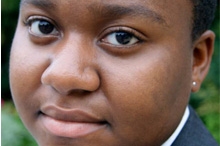
Ki’tay Davidson is being honored as a Champion of Change for embodying the next generation of leadership within the disability community and his commitment to the promise of the Americans with Disabilities Act.
“It is our duty to fight, it is our duty to win. We must love each other and protect each other. We have nothing to lose but our chains.” – Assata Shakur
In a world where our environments are not designed to affirm diversity or natural human variation, people with disabilities are relegated to the sidelines and treated as though our existence is burdensome and inconvenient. Disabilities are often viewed as an “epidemic” or “illness” that requires “curing”. When individuals are told they should have been prevented or cured, how does that affect one’s perceived worth in society? How does that perpetuate exclusive environments? Undoubtedly, our society is designed for the able-bodied population and only this state of being has been normalized as “correct” and “ideal.”
However, when I reflect on the disability rights movement I am overwhelmed and in awe. The injustices of our society are institutional and it is easy to become complacent, fatigued or entitled; but our community’s ability to disrupt the dominant narrative by advocating unrelentingly is incredible.
Nevertheless, I challenge the extent to which we place the responsibility for advocacy on those designated as leaders or “champions.” Advocacy is not just a task for charismatic individuals or high profile community organizers. Advocacy is for all of us; advocacy is a way of life. It is a natural response to the injustices and inequality in the world. While you and I may not have sole responsibility for these inequities that does not alter its reality.
As such, today I am thankful. I am thankful for every ally and individual working, struggling and fighting to make this world a better place--thankful to any and everybody who realizes that this world is bigger than themselves, and who channels that awareness to “level the playing field.” These are people who can acknowledge their privilege and opportunity, and consciously and intentionally use their existence to transform communities. Change--radical change-- requires that we challenge the institutions and discourse that perpetuate oppression. It requires that we challenge ourselves.
I may have earned a prestigious award, but today it is not really about me. It is about the community and I am simply a singular representative of thousands of people who give their hearts and their time to living a life of transformation.
“Radical simply means grasping at the root.”
I have always loved this quote and today it still rings true. Thank you for grabbing at the root, for being champions of your community. Thank you to all the champions who came before me, to those I have met, and to those who I have yet to meet. Thanks to those champions who have encouraged, listened, affirmed, fought and loved, alongside our beautiful community. Together, we have made change and will continue to make change. There are many chains that need to be broken. We all know it. I support you and welcome you to hold me accountable as we hold all of ourselves accountable to facilitating inclusive and loving environments for all.
Lead on.
Ki’tay Davidson is a social justice advocate and innovationist.
Learn more about Civil Rights, DisabilitiesChallenges + Competitions = Champions
Posted by on August 15, 2013 at 1:44 PM EST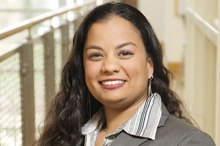 Anjali Forber Pratt is being honored as a Champion of Change for embodying the next generation of leadership within the disability community and her commitment to the promise of the Americans with Disabilities Act.
Anjali Forber Pratt is being honored as a Champion of Change for embodying the next generation of leadership within the disability community and her commitment to the promise of the Americans with Disabilities Act.Champions are victors in challenges or competitions and, as a Paralympic athlete, I have had the opportunity to be a champion in numerous races. Though, I truthfully never thought of myself as a champion of change because I simply do what I love: Make a difference in the lives of others and improve the landscape of disability nationwide and worldwide.
Being different, heads always turned when out in public. This wheelchair is what I know; I was sick as an infant with transverse myelitis that left me paralyzed. Before I first saw wheelchair racers competing at the Boston Marathon, I believed that I was going to simply outgrow my disability – that it was a phase. I thought to become an adult, I had to first get rid of my disability. Whether it was my skin color or my physical disability, it is not uncommon for me to stroll through an airport and have eyes starring or hear children whispering, "Mommy, what's that?" as they point to my wheelchair. For me, it has been about embracing these moments as teachable moments and using them as a foundation for my platform of change. I began doing this and integrating these opportunities to teach into my everyday life at a young age whether it was on a small scale of taking time to answer a child's innocent questions at a grocery store, or speaking to community groups about my disability. This eventually grew to a much larger scale of taking on my school district in federal court regarding equal access to education, and representing my country on the world stage at the Paralympic Games.
My underlying passion for my quest to make a difference stems from my motto: Dream. Drive. Do. I have been blessed with amazing opportunities in my life, and each of these opportunities has expanded my platform to initiate change that much bigger.
In the U.S., I am actively involved in my communities to show what people with disabilities are capable of. I help teach sport clinics and speak to corporations and non-for-profits about living life with a disability. I am actively involved with both US Paralympics, a division of the United States Olympic Committee as well as with Disabled Sports USA helping to provide sport opportunities for persons with disabilities and their families. Sports provided me with confidence and independence and was a constructive outlet for the daily frustrations I faced in our society. These experiences are rewarding because I can be a role model for others and for a young kid to realize they can be somebody when they grow up. The afternoon following the Champions of Change event, I boarded a plane to spend a couple days at a family camp for kids with transverse myelitis. Interacting with these families, I was reminded of what it was like for me to be a kid and how powerful it was for me to see wheelchair racers who went to college. I learned at a young age that life was worth living, disability and all. I saw huge changes in these kids’ demeanors and watched their self-confidence grow as they challenged me to a race or told me about their favorite subject in school. To be on the flipside as an engaged citizen and a role model does make me feel like a Champion of Change.
In addition to my athlete hat, I am also a scholar and these same issues shape my research agenda. My research interests center around individuals who are not given a chance, or who are left on the sidelines. My research interests focus on individuals who struggle to succeed due, in part, to some difference that has labeled them outside the mainstream. My work cuts across education (elementary, secondary and post-secondary), sports, work, and quality of life contexts. I am passionate about helping others to transform perceptions of what it means to be different, helping others accept their own differences, and motivating others to take action in their own lives and communities. As a member of more than one minority group, I have had personal experiences of being left on the sidelines, and I have faced resistance trying to emerge as a leader. It is my belief that oftentimes it is precisely these sidelined individuals who are able to help inspire others based on their own experiences. Therefore, I see my research as being instrumental not only to aid in the development of future leaders, but also to the academic field to provide empirical support for this.
Beyond the borders of the United States, I proudly wear a Team USA jersey as I compete or teach sports clinics. Wearing this jersey comes with a responsibility to pay it forward. I have realized the power of this, and love motivating others to live up to their fullest potential. I have learned from my work in Ghana, Bermuda and India in particular that sport can be a catalyst for social change. Providing individuals with an opportunity to succeed athletically gains the attention of policy makers, educators, and community members. In these cases, I have seen perceptions of disability change to become more open and accepting. Individuals with disabilities cannot be denied this opportunity, which is why it is a part of my cause. As such, I have co-written an educational coloring book Color. Learn & Play: All About Sports for Athletes with Physical Disabilities that is available online. Sport unifies us all. Sport provides an opportunity for individuals to come together regardless of race, political background, ability status, and/or gender. Sport is unique in that it transcends these boundaries and barriers imposed by society and allows for the focus to be on the activity itself, the sportsmanship, the finish line, or the end of the match. Deeper than that is the honor of representing one’s country that sport can also provide. For people with disabilities in many places I have visited abroad, who have previously been excluded from many affordances of society such as an education or pursuing a career, sport is one way where this can change. It has been my experiences with challenges, and competitions that have shaped me into a champion. I am truly honored to be a Champion of Change.
Anjali Forber Pratt is a Paralympic Medalist.
Learn more about Civil Rights, DisabilitiesMaking the World Accessible for Deaf and Hard of Hearing People
Posted by on August 15, 2013 at 1:15 PM EST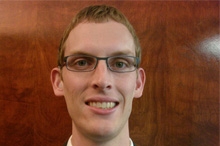 Andrew Phillips is being honored as a Champion of Change for embodying the next generation of leadership within the disability community and his commitment to the promise of the Americans with Disabilities Act.
Andrew Phillips is being honored as a Champion of Change for embodying the next generation of leadership within the disability community and his commitment to the promise of the Americans with Disabilities Act.I am deaf and the world is often inaccessible to me. This inaccessibility is not because I cannot hear, but because many things are designed without people like me in mind. As a result of this unintended design, I am left out and not able to fully participate in society. I’m unable to understand announcements on trains, enjoy in-flight entertainment on planes, and watch many videos online. But this does not have to be. As a lawyer at the National Association of the Deaf (NAD), I am part of a committed group of disability rights advocates who are working to change the world.
In the last few years we’ve been working on the implementation of the Twenty-First Century Communications and Video Accessibility Act of 2010 which requires that videos shown on television with captions must also be captioned when shown online afterwards. With this change, deaf and hard of hearing people who previously could not understand hundreds of thousands of hours of online content now have full access. However, much work remains to be done because, even with this law, deaf and hard of hearing people are still denied access to many online videos such as newly released movies and the growing number of online-only programs.
The NAD has also persuaded two major online video programming distributors to caption all of their online video content despite gaps in certain laws. We hope that more distributors will follow their lead and recognize the importance of providing access to 48 million deaf and hard of hearing Americans. Our advocacy efforts have even led to the development of new ways for people to add captions to their personal online videos.
I was born in the early 1980s and grew up as a child of the Americans with Disabilities Act. Growing up, I had much more access than older generations of deaf and hard of hearing people, as I had the benefit of captioned television programs, telephone relay systems, and the provision of communication access in law school. I owe a great deal of gratitude to the disability rights champions who came before me, and I stand on the shoulders of giants as I fight for more change – so that the next generation will have full and equal access, including the enjoyment of all online programming, in-flight entertainment, as well as being able to receive accessible public announcements. I look forward to the day when I and others like me will be fully included in the communications of our society.
Andrew Phillips is the Policy Counsel at the National Association of the Deaf in Silver Spring, MD. His disability advocacy work has taken him from his hometown Berkeley, CA to the plains of Siberia and into the halls of Congress.
Learn more about Civil Rights, Disabilities
- &lsaquo previous
- …
- 44
- 45
- 46
- 47
- 48
- 49
- 50
- 51
- 52
- …
- next &rsaquo
White House Blogs
- The White House Blog
- Middle Class Task Force
- Council of Economic Advisers
- Council on Environmental Quality
- Council on Women and Girls
- Office of Intergovernmental Affairs
- Office of Management and Budget
- Office of Public Engagement
- Office of Science & Tech Policy
- Office of Urban Affairs
- Open Government
- Faith and Neighborhood Partnerships
- Social Innovation and Civic Participation
- US Trade Representative
- Office National Drug Control Policy
categories
- AIDS Policy
- Alaska
- Blueprint for an America Built to Last
- Budget
- Civil Rights
- Defense
- Disabilities
- Economy
- Education
- Energy and Environment
- Equal Pay
- Ethics
- Faith Based
- Fiscal Responsibility
- Foreign Policy
- Grab Bag
- Health Care
- Homeland Security
- Immigration
- Innovation Fellows
- Inside the White House
- Middle Class Security
- Open Government
- Poverty
- Rural
- Seniors and Social Security
- Service
- Social Innovation
- State of the Union
- Taxes
- Technology
- Urban Policy
- Veterans
- Violence Prevention
- White House Internships
- Women
- Working Families
- Additional Issues

